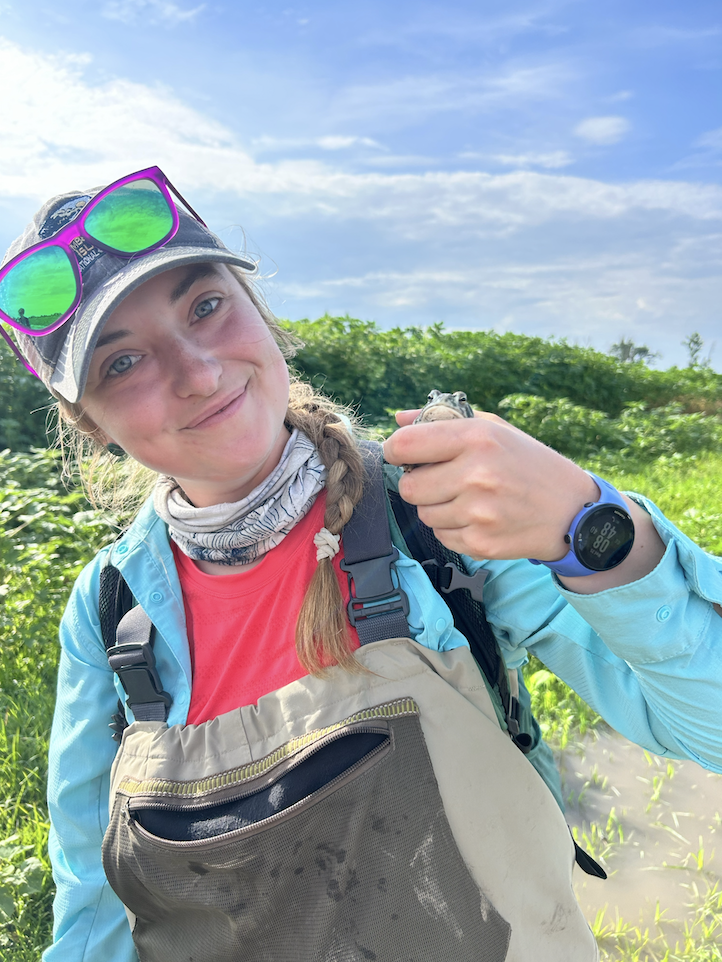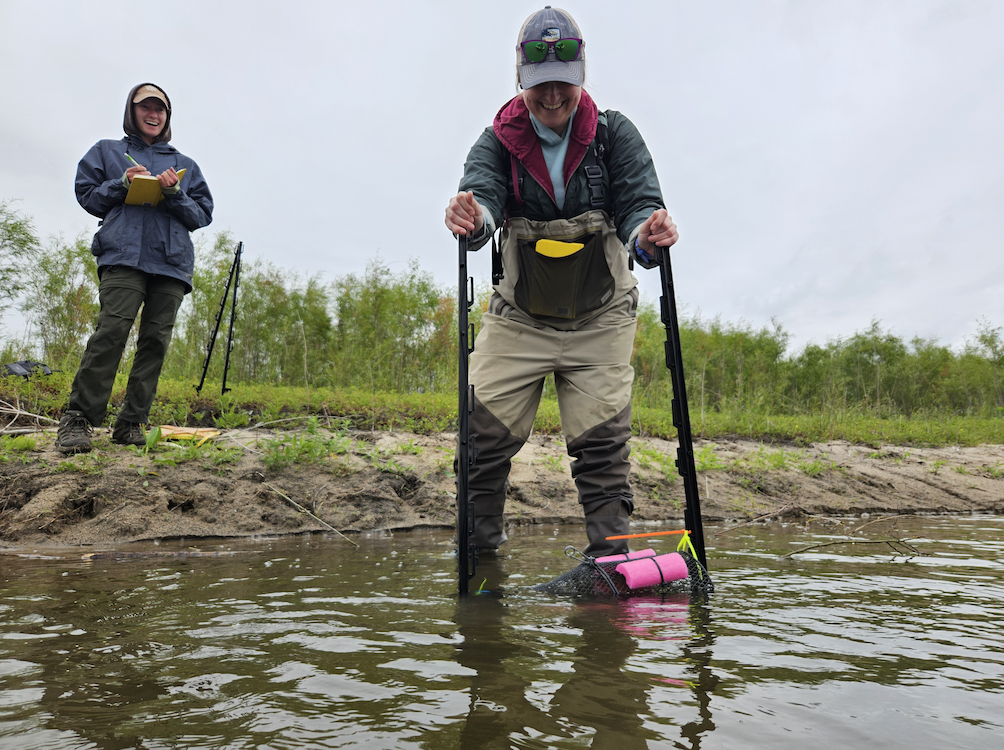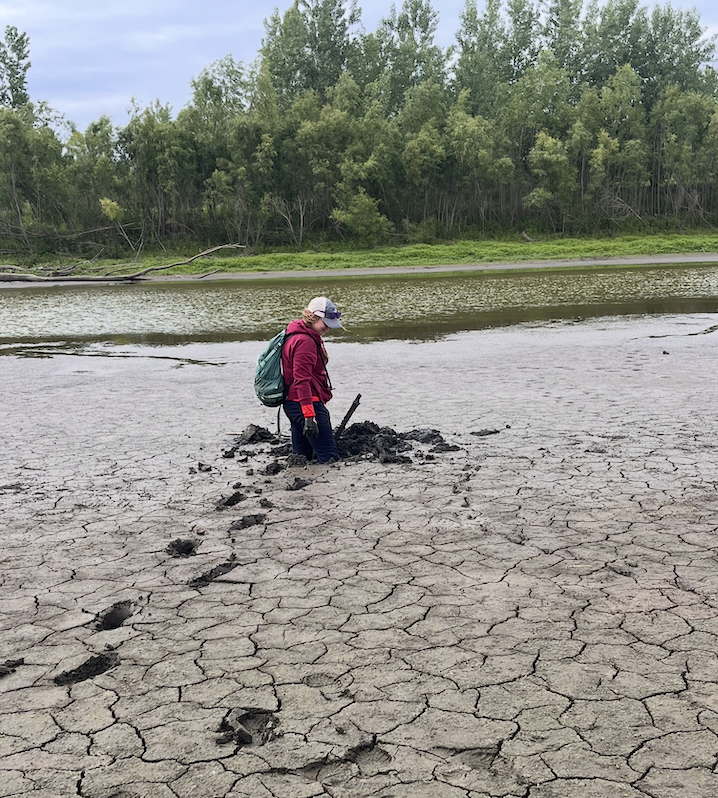For Natural Infrastructure Graduate Fellow Aurora Fowler, field work is a way to understand how ecosystems respond to change on the ground–and in the mud. During her six weeks living out of a camper along the lower Missouri River this summer, she investigated the froggy details of a region shaped by decades of levees, flood control and shrinking wetlands.
Fowler’s work is part of a broader effort by the Institute for Resilient Infrastructure Systems and the River Basin Center to evaluate how levee setbacks, a nature-based solution that involves widening riverine floodplains to give floodwaters more space to spread, affect habitats and the species within them.
The region where Fowler is working, has been widely impacted by large-scale flooding over the last several decades, leading the US Army Corps of Engineers to implement a series of levee setbacks along the river. This gives the UGA project team a unique opportunity to study sites before, during, and after a levee setback is completed.
Approximately half of all Endangered Species Act species in the United States are dependent on wetlands, and these ecosystems are shrinking. In the Missouri River floodplains where Fowler’s field sites lay, wetlands are all but disappearing, with a vast majority already drained or filled.

“This is a part of the world that I’m personally from,” said Fowler (a Nebraska native), “and these communities deserve our attention. They deserve to be able to resiliently plan their futures.”
The project includes work utilizing everything from NASA satellite data to recording devices for detecting birdcalls, but Fowler is focused on frogs.
“Within the larger biodiversity benefits of levee setbacks, [my project] looks at anuran response,” Fowler explained. “Anurans are what we might know as frogs and toads, and we’re trying to understand what impacts those are having on sensitive taxa like amphibians when we’re doing these floodplain restorations.”
This isn’t Fowler’s first time in the field–she joined the Odum School of Ecology with a career full of unique experiences.
“I started in salty systems,” Fowler explained. Her undergraduate degree from Florida’s Nova Southeastern University is in marine biology. After graduating, she spent a year as a NOAA fisheries observer on commercial marine vessels, and then helping to run the research program on Little St. Simons Island in coastal Georgia. “I think everybody in this career field is sort of innately curious, so it was really awesome to be afforded the opportunity to just be curious about anything.”
But after a few years of working with everything from sharks to sea turtles to shorebirds, Fowler directed her attention inland, working to understand the ecology of wetlands.
“I really had the opportunity to explore so many different things,” she said. But freshwater wetlands were special: “I just felt really connected to them… this was a system I could see working in for the rest of my life.”

Although she’s been in the field plenty of times (and certainly, between sharks and commercial fishing vessels, in her share of high-pressure field scenarios), this was Fowler’s first time on a longer field journey, and on top of that–she was in charge. Fowler was responsible not only for figuring out her own food, shelter, sampling route and field equipment, but a rotating cast of technicians and volunteers.
“I mean, how can you complain about six weeks of just getting to muck around in wetlands and pick up frogs?” she said. “A lot of us get into this field because of our love of being outside… we really just had the best time.”
Having never seen her field sites before, the planning of the season was quite the organizational challenge, further complicated by surprises upon her arrival like surprisingly cold weather and severe early-summer drought. These challenges were made up for by fun surprises: a goose-banding side quest with the Department of Natural Resources, employing her own parents as field technicians, and an array of very grumpy frogs.
“At one point, I got myself extremely stuck in the mud and sank almost up to my waist,” Fowler laughed. “I had to abandon my boots and bear crawl out. I don’t think I found it funny in the moment, but it was one of those moments you just have to laugh about.”
She was unable to retrieve the boots. “I made my contribution to the geological timeline,” she said.

Back in Athens this fall, Fowler is digging into the data she collected while planning out her next field season, in hopes of collecting a second year of data before finishing her thesis in 2026. Her work at UGA is characterized by learning new skills, from the expected (data collection, field experience, project management) to the unexpected (emergency mud-sink protocols).
“One of the main reasons I came back to grad school was to become more proficient in things like this,” she said. “This is a huge collaborative effort made possible by so many people, and I feel very fortunate to be able to work on it.”
Fowler’s work is supported through our partnership with Ducks Unlimited to fund the Natural Infrastructure Graduate Fellowship. Learn more about this program here.
Photos provided by Aurora Fowler.


